AfroTech Conference Reveals Black Women’s Paths to Tech Are Legion
By Katrina L. Spencer
Reporting Texas
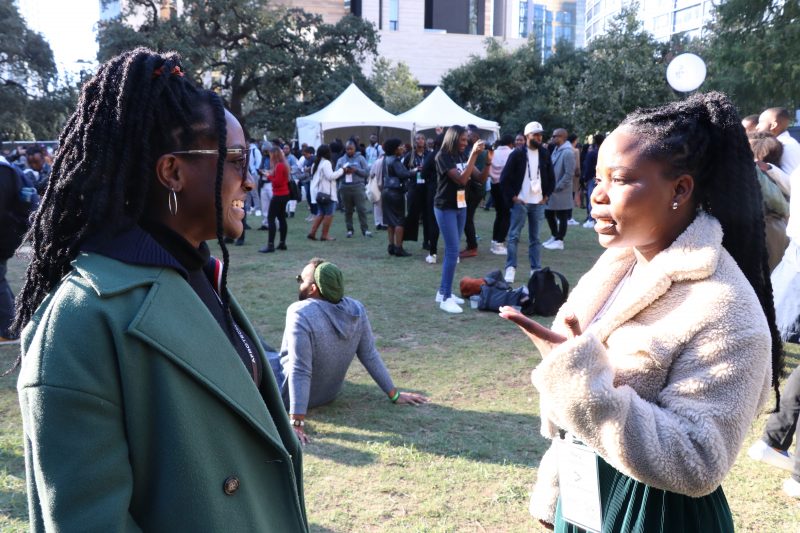
Tamisha Segbefia, left, and Mary Appleton chat at AfroTech ‘23’s opening ceremony held at Republic Square Park in Austin, Texas, Nov. 1, 2023. The two were sponsored by Nyamekye Wilson’s Black Sisters in STEM and traveled from the east coast to attend the annual conference. Photo by Katrina L.Spencer/Reporting Texas.
Deejay Jasmine Solano is spinning hip-hop, R&B, soul and funk at the front of ACL Live in Austin. The floor has been cleared of dozens of chairs from serious panel talks from earlier in the week, and now Black people, mostly aged 25 to 45, are two-stepping and doing throwback dances from their teenage years.
Austin doesn’t regularly see this many Black folks – tens of thousands – altogether at once, but it’s AfroTech, in its seventh year, and these entrepreneurs, engineers and tech workers are eager to be together.
Kaporsha Alexander, who lives in St. Louis, is at the back of the room reflecting on the past four days of the tech conference, reviewing what has gone well and what could have been better. “There’s a lot of Afro, very little tech,” she said of the conference.
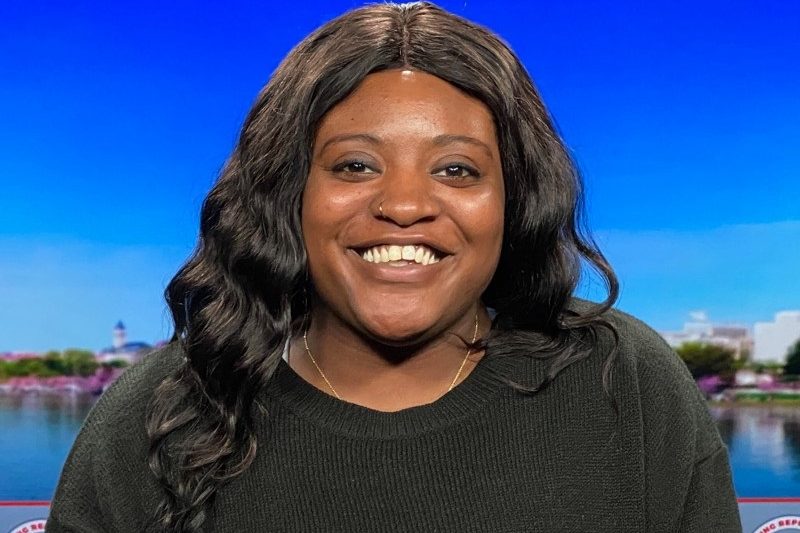
Army veteran Kaporsha Alexander from Mississippi works in tech in St. Louis, Missouri. She recommends udemy.com and freecodecamp.com for people interested in learning about coding. Photo provided by Kaporsha Alexander.
At 30, Alexander is a first-time AfroTech attendee and an application engineer at Lightstar Renewables, a solar energy company. She came to tech after 3½ years in the Army, where she started to learn about coding.
“I grew up poor, Black and that was a way for me to be – basically get out of Mississippi and get college paid for and get some benefits and be able to take care of myself,” she says.
“I thought that I’d be a nurse, married with like five kids by now. That was my goal. To get married, have kids, have a family.”
The marriage and the kids have yet to happen. But coding planted new seeds and thoughts in her imagination that are sprouting and growing.
“I now have a career that I never dreamed of,” she says. “Code, it just opens up so many doors that you would never believe.”
Now she’s thriving, not just surviving, in a job that pays $80,000 to $100,000. She may create her own app one day, she says, marveling that one can change the world with just a laptop and knowledge of a programming language or two.
Alexander is just one of countless Black professionals venturing into the world of tech. The AfroTech conference in November was a chance for them to commune, celebrate successes and share their struggles in the overwhelmingly homogeneous tech industry.
Almost 14 percent of the United States’ population is Black, according to the U.S. Census, but only 3 percent of the computing workforce were Black or African-American women in 2022, according to the National Center for Women and Information Technology’s “By the Numbers.” Women overall hold only 26.7% of tech employment, while men hold 73.3% of these positions, according to 2022 data from the employment recruiting website Zippia.
Several high-profile events have exposed the tech industry’s troubles retaining Black women. In 2020, Google drew criticism for its treatment of Black employees after Google researcher Timnit Gebru told of being forced out for warning that artificial intelligence can spread racism and the company fired diversity recruiter April Christina Curley.
It’s not that the field does not need Black women. Safiya U. Noble’s 2018 book “Algorithms of Oppression: How Search Engines Reinforce Racism,” for instance, chronicled how search results tended to oversexualize Black girls, showing what can be at risk when technical systems reflect creators’ biases and misrepresent entire demographics.
AfroTech, in its second year in Austin before heading to Houston next year, represented a chance for Black tech professionals to discuss the state of the industry, to network with each other and to recruit others. And it highlighted the many paths that Black women have taken to their tech careers.
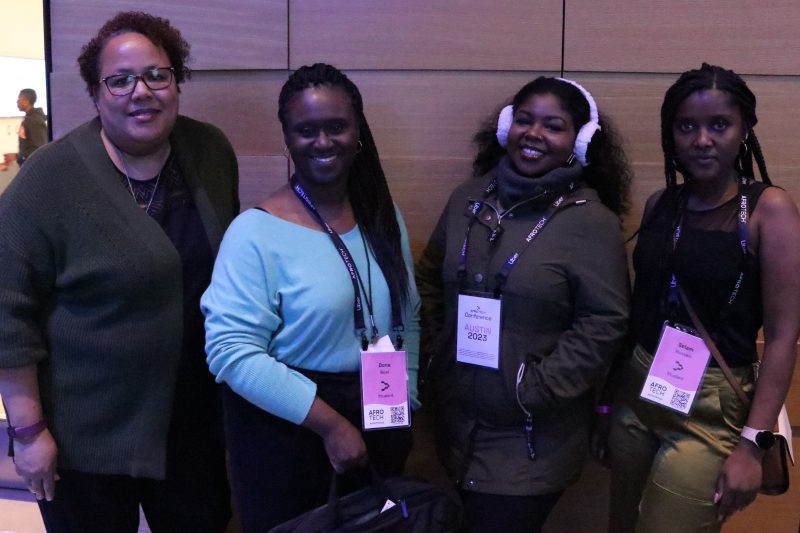
Chief operating officer of NPower Canada Nisha Lewis, left, poses with first-time AfroTech attendees Dona, Jada and Selam. The three newbies traveled from different Canadian territories to attend AfroTech ‘23 in Austin, Texas, in November. Photo by Katrina L. Spencer/Reporting Texas.
Nisha Lewis, chief operating officer of NPower Canada, accompanied three young women on their first visit to Texas and AfroTech. Their trip was supported by the Fund II Foundation, an effort led by Black billionaire Robert Smith.
NPower, an international nonprofit that started about 20 years ago in New York City, aims to get people who are unemployed into the tech sector, where there are 500,000 – 800,000 unfilled jobs in Canada, Lewis says. The three women accompanying Lewis to Austin are of Haitian, Ethiopian and Jamaican descent and participate in NPower’s 15-week training program that develops technical, professional and personal skills.
“Eighty percent of our graduates are employed or in education and training within six months of graduating,” Lewis said.
NPower is just one of numerous initiatives designed to launch tech careers and impact the field, and more Black women are finding their way there in a variety of ways.
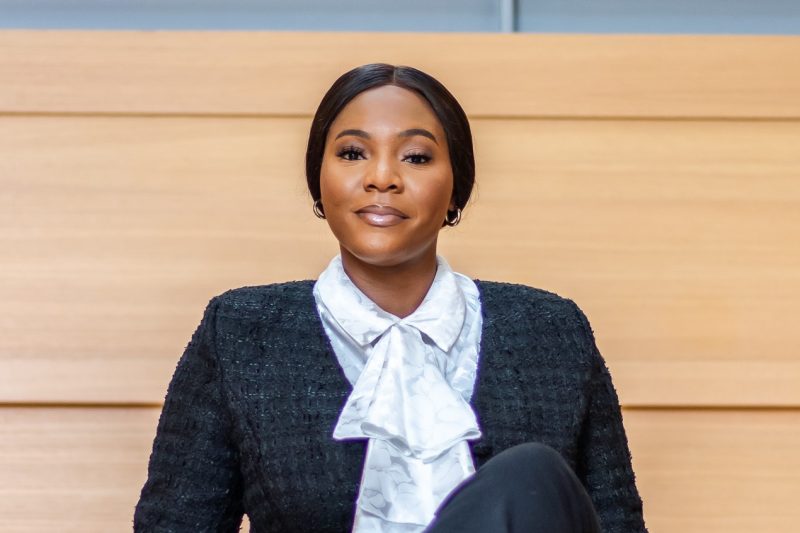
Grace Akomezogho, from Gabon in West Africa, works as a data analyst for Apple. On LinkedIn, she lists herself as a “mompreneur” and has launched Mathstetic, a tutoring platform where people share their love of math. Photo provided by Grace Akomezogho.
“Black people really have each other’s back right now,” said AfroTech attendee Grace Akomezogho, 27, a data analyst at Apple in Austin who is from Libreville, Gabon, in West Africa.
Before entering the tech industry, she was an after-school teacher. It was a Black recruiter who contacted her via LinkedIn expressing interest in her applying for a role. Akomezogho was not sure the initial query was real, asking herself, “Is this a spam?” That was four years ago.
She says that tech is trending now but that this was not always the case and perhaps will not be in the future. Slipping into French, she remembers a climate that was a no man’s land summarized in the saying “Chacun pour soi; Dieu pour tous” or “Everyone for themselves; God for all.”
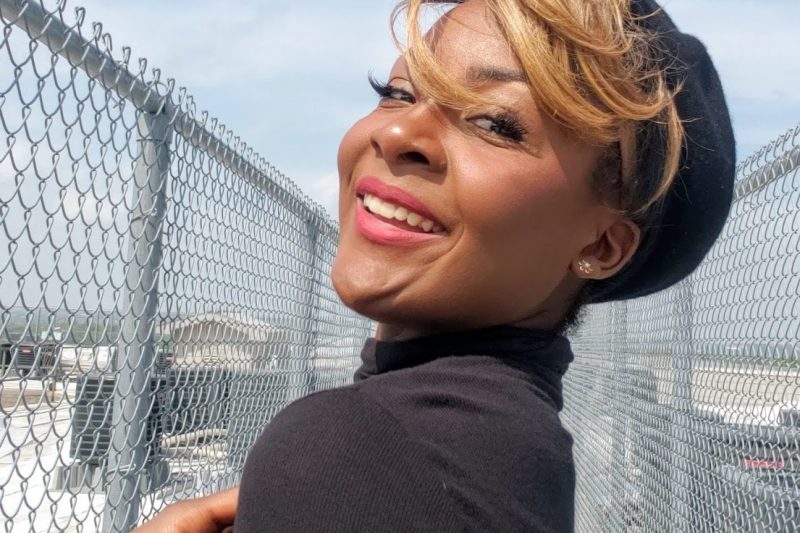
Ariel Lee from Jacksonville, Florida, is a user experience designer for Amazon. An entrepreneurship program at the University of Texas at Austin introduced her to the world of tech. Her product design skills have led to her tarot card brand, Rudu Rudu. Photo provided by Ariel Lee.
Ariel Lee, 25, from Jacksonville, Florida, and a user experience designer for Amazon’s Austin office, broke into tech via HireBlack, a recruitment network designed to connect Black workers with employment opportunities.
Lee majored in studio art as an undergraduate and her first interest was in product design. Lee pursued a minor in entrepreneurship through the University of Texas at Austin with the Product Prodigy Institute, which “takes students from underprivileged and underrepresented backgrounds through the process of learning the skills to launch their own venture” and she was steered down new avenues.
“The entrepreneurship community here in Austin has really helped create me and turn me into who I am today, which I’m very, very grateful for,” Lee said.
She now engages in both tech and product design and is launching a tarot card brand, “Rudu Rudu,” which, in Yoruba, a language indigenous to Africa, means “chaos.”
“I really am excited about just all of the new innovative ideas that I’ve been learning about while I’m here,” Lee said of her AfroTech experience. “So I’m just here to absorb knowledge and see what sort of things are out there in the design space and other companies that are also innovating.”
She mentioned Baddies in Tech as another community group designed to support women of color in the field and Tribaja, which describes itself as “a talent marketplace and community for under- supported tech talent.”
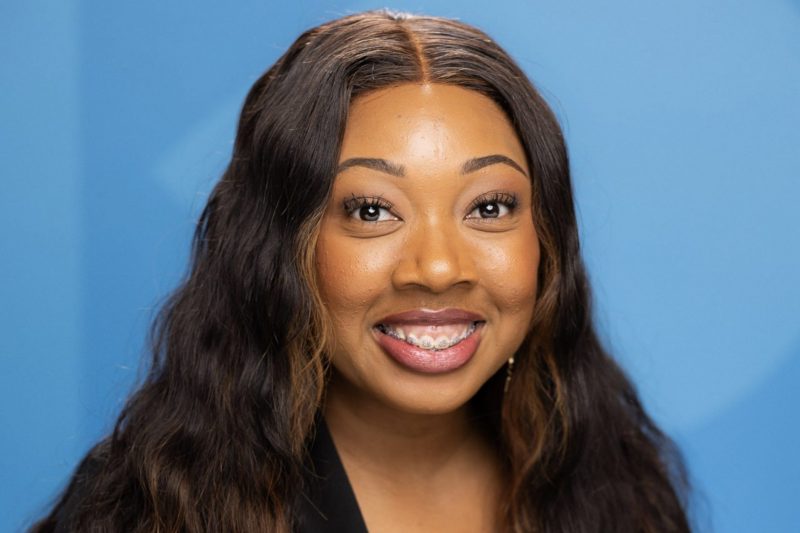
Jaronica Sneed from Pine Bluff, Arkansas, lives in Austin, Texas, and works as an account manager for advertising agency GSD&M. She was paid to learn to code by the Tech Equity Collective. Photo provided by Jaronica Sneed
Jaronica Sneed, 29, from Pine Bluff, Arkansas and an account manager for Austin-based advertising agency GSD&M, said that the Tech Equity Collective was the supportive body that launched her tech career and sponsored her attendance at AfroTech this year. The collective is built for underrepresented groups who have not had access to training in tech and Sneed said that within it she was paid to learn how to code.
Sneed said that the Tech Equity Collective’s goal is achieved through the AfroTech conference as it is to “get us in these rooms to network at the expo hall and submit your resume, and we have the opportunity to do just that.”
These tech trainees and workers represent a young generation of Black women that is hungry, ambitious and willing to travel in pursuit of employment and networking opportunities.
Lewis and her band were satisfied with their experience and she will advocate for even more sponsored visits to AfroTech ‘24 in Houston. She asserted the importance of spaces that celebrate Black excellence and wants to make sure NPower is preparing people for the future of work, noting its ever changing nature.
“There’s never a bad time to learn something new,” she said. “There’s never a bad time to pivot to a new industry or opportunity.”